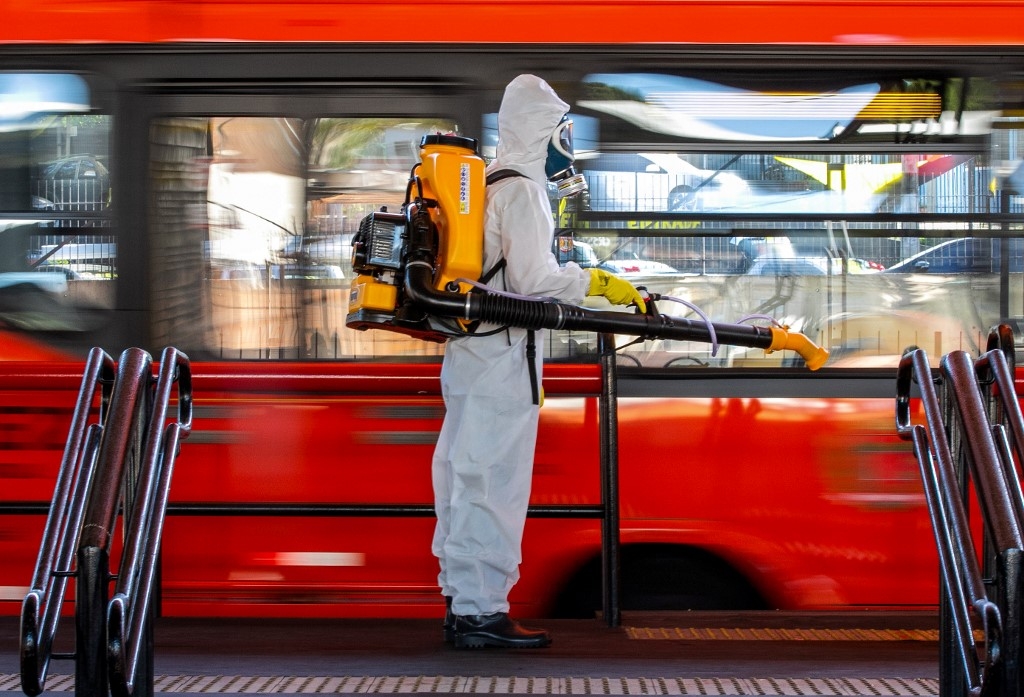Brazil state signs deal to make Russian vaccine
 |
| Military personnel from the Brazilian Armed Forces sanitizes a bus at the Santa Candida bus terminal to combat the spread of the the novel coronavirus, COVID-19, in Curitiba, Parana State, Brazil, on August 10, 2020. The pandemic has killed at least 731,518 people worldwide, 101,049 of them in Brazil, since it surfaced in China late last year, according to a tally from official sources compiled by AFP at 1100 GMT on Monday. (Photo: Daniel CASTELLANO / AFP) |
The vaccine would have to receive Brazilian regulatory approval and complete Phase 3 clinical trials, or large-scale testing in humans, before being produced in Brazil, said officials from the southern state.
Production, if it goes ahead, would likely only start in the second half of 2021, said Jorge Callado, head of the state-run Parana Technology Institute, which signed the deal with the Russian Direct Investment Fund (RDIF).
"This is a very objective memorandum of understanding on technological exchange. It does not impose obligations, it simply enables us to work together," he told a virtual news conference.
He said that under the deal Russia would share the results of Phase 1 and 2 testing with the state.
President Vladimir Putin announced Tuesday that Russia had approved the vaccine, dubbed "Sputnik V," in a world first, heralding it as a game-changer in the pandemic.
But international health officials have cautioned more testing and scrutiny are needed to ensure it is safe and effective.
Brazil has become a popular testing ground for COVID-19 vaccines, since the new coronavirus is still spreading quickly there.
The country has the second-highest number of infections and deaths in the pandemic, after the United States: more than 3.1 million and 104,000, respectively.
Two experimental vaccines are currently in Phase 3 testing in Brazil, one developed by Oxford University with pharmaceutical firm AstraZeneca and the other by Chinese laboratory Sinovac Biotech.
What the stars mean:
★ Poor ★ ★ Promising ★★★ Good ★★★★ Very good ★★★★★ Exceptional
Themes: COVID-19
- 67 million children missed out on vaccines because of Covid: UNICEF
- Vietnam records 305 COVID-19 cases on October 30
- 671 new COVID-19 cases recorded on October 1
- Vietnam logs additional 2,287 COVID-19 cases on Sept. 21
- People’s support decisive to vaccination coverage expansion: official
Related Contents
Latest News
More News
- Russian President congratulates Vietnamese Party leader during phone talks (January 25, 2026 | 09:58)
- Worldwide congratulations underscore confidence in Vietnam’s 14th Party Congress (January 23, 2026 | 09:02)
- Political parties, organisations, int’l friends send congratulations to 14th National Party Congress (January 22, 2026 | 09:33)
- 14th National Party Congress: Japanese media highlight Vietnam’s growth targets (January 21, 2026 | 09:46)
- 14th National Party Congress: Driving force for Vietnam to continue renewal, innovation, breakthroughs (January 21, 2026 | 09:42)
- Vietnam remains spiritual support for progressive forces: Colombian party leader (January 21, 2026 | 08:00)
- Int'l media provides large coverage of 14th National Party Congress's first working day (January 20, 2026 | 09:09)
- Vietnamese firms win top honours at ASEAN Digital Awards (January 16, 2026 | 16:45)
- ASEAN Digital Ministers' Meeting opens in Hanoi (January 15, 2026 | 15:33)
- ASEAN economies move up the global chip value chain (December 09, 2025 | 13:32)

 Tag:
Tag:




















 Mobile Version
Mobile Version